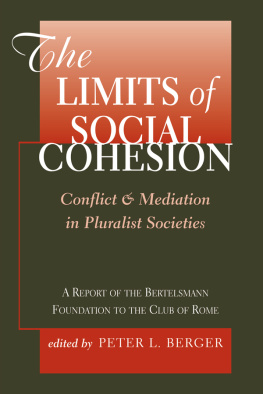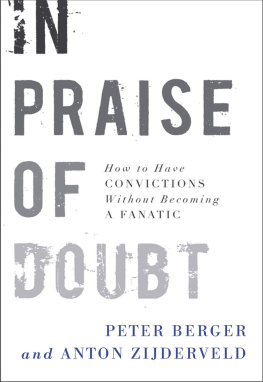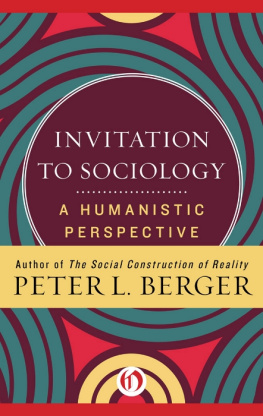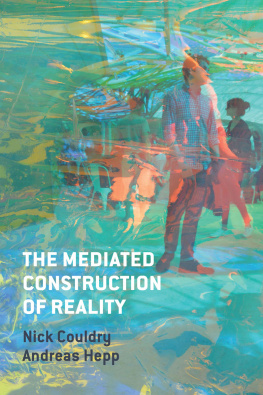Peter L. Berger - The Social Construction of Reality: A Treatise in the Sociology of Knowledge
Here you can read online Peter L. Berger - The Social Construction of Reality: A Treatise in the Sociology of Knowledge full text of the book (entire story) in english for free. Download pdf and epub, get meaning, cover and reviews about this ebook. year: 1967, publisher: Anchor, genre: Science. Description of the work, (preface) as well as reviews are available. Best literature library LitArk.com created for fans of good reading and offers a wide selection of genres:
Romance novel
Science fiction
Adventure
Detective
Science
History
Home and family
Prose
Art
Politics
Computer
Non-fiction
Religion
Business
Children
Humor
Choose a favorite category and find really read worthwhile books. Enjoy immersion in the world of imagination, feel the emotions of the characters or learn something new for yourself, make an fascinating discovery.

- Book:The Social Construction of Reality: A Treatise in the Sociology of Knowledge
- Author:
- Publisher:Anchor
- Genre:
- Year:1967
- Rating:5 / 5
- Favourites:Add to favourites
- Your mark:
- 100
- 1
- 2
- 3
- 4
- 5
The Social Construction of Reality: A Treatise in the Sociology of Knowledge: summary, description and annotation
We offer to read an annotation, description, summary or preface (depends on what the author of the book "The Social Construction of Reality: A Treatise in the Sociology of Knowledge" wrote himself). If you haven't found the necessary information about the book — write in the comments, we will try to find it.
The Social Construction of Reality: A Treatise in the Sociology of Knowledge — read online for free the complete book (whole text) full work
Below is the text of the book, divided by pages. System saving the place of the last page read, allows you to conveniently read the book "The Social Construction of Reality: A Treatise in the Sociology of Knowledge" online for free, without having to search again every time where you left off. Put a bookmark, and you can go to the page where you finished reading at any time.
Font size:
Interval:
Bookmark:
PENGUIN BOOKS
THE SOCIAL CONSTRUCTION OF REALITY
Peter L. Berger is Professor of Sociology at Boston University and Director of the Institute for the Study of Economic Culture. He has previously been Professor of Sociology at Rutgers University, New Jersey, and in the Graduate Faculty of the New School for Social Research in New York. He is the author of many books including Invitation to Sociology, Pyramids of Sacrifice, Facing up to Modernity, The Heretical Imperative and The Capitalist Revolution, and is co-author (with Hansfried Kellner) of Sociology Reinterpreted and (with Brigitte Berger) of Sociology: A Biographical Approach and The War over the Family.
Thomas Luckmann is at present Professor Emeritus of Sociology at the University of Constance, Germany. Previously he taught at the University of Frankfurt, at the Graduate Faculty of the New School for Social Research in New York, and was fellow at the Center for Advanced Study in Behavioral Sciences in Stanford. He has published widely, and his titles include The Invisible Religion, The Sociology of Language, Life-World and Social Realities, The Structures of the Life-World (with Alfred Schtz), Morals in Everyday Life (in German) and The Theory of Social Action. He is editor of Phenomenology and Sociology and The Changing Face of Religion (with James A. Beckford).
Peter L. Berger
and Thomas Luckmann
The Social Construction of Reality
A Treatise in the Sociology
of Knowledge

Penguin Books
PENGUIN BOOKS
Published by the Penguin Group
Penguin Books Ltd, 80 Strand, London WC2R 0RL, England
Penguin Putnam Inc., 375 Hudson Street, New York, New York 10014, USA
Penguin Books Australia Ltd, 250 Camberwell Road, Camberwell, Victoria 3124, Australia
Penguin Books Canada Ltd, 10 Alcorn Avenue, Toronto, Ontario, Canada M4V 3B2
Penguin Books India (P) Ltd, 11 Community Centre, Panchsheel Park, New Delhi 110 017, India
Penguin Books (NZ) Ltd, Cnr Rosedale and Airborne Roads, Albany, Auckland, New Zealand
Penguin Books (South Africa) (Pty) Ltd, 24 Sturdee Avenue, Rosebank 2196, South Africa
Penguin Books Ltd, Registered Offices: 80 Strand, London WC2R 0RL, England
www.penguin.com
First published in the USA 1966
Published in Great Britain by Allen Lane
The Penguin Press 1967
Published in Penguin University Books 1971
Reprinted in Peregrine Books 1979
Reprinted in Pelican Books 1984
Reprinted in Penguin Books 1991
Copyright Peter L. Berger and Thomas Luckmann, 1966
All rights reserved
Except in the United States of America, this book is sold subject to the condition that it shall not, by way of trade or otherwise, be lent, re-sold, hired out, or otherwise circulated without the publisher's prior consent in any form of binding or cover other than that in which it is published and without a similar condition including this condition being imposed on the subsequent purchaser
ISBN: 978-0-14-193163-0
The present volume is intended as a systematic, theoretical treatise in the sociology of knowledge. It is not intended, therefore, to give a historical survey of the development of this discipline, or to engage in exegesis of various figures in this or other developments in sociological theory, or even to show how a synthesis may be achieved between several of these figures and developments. Nor is there any polemic intent here. Critical comments on other theoretical positions have been introduced (not in the text, but in the Notes) only where they may serve to clarify the present argument.
The core of the argument will be found in Sections Two and Three (Society as Objective Reality and Society as Subjective Reality), the former containing our basic understanding of the problems of the sociology of knowledge, the latter applying this understanding to the level of subjective consciousness and thereby building a theoretical bridge to the problems of social psychology. Section One contains what might best be described as philosophical prolegomena to the core argument, in terms of a phenomenological analysis of the reality of everyday life (The Foundations of Knowledge in Everyday Life). The reader interested only in the sociological argument proper may be tempted to skip this, but he should be warned that certain key concepts employed throughout the argument are defined in Section One.
Although our interest is not historical, we have felt obliged to explain why and in what way our conception of the sociology of knowledge differs from what has hitherto been generally understood by this discipline. This we do in the Introduction. At the end, we make some concluding remarks to indicate what we consider to be the pay-off of the present enterprise for sociological theory generally and for certain areas of empirical research.
The logic of our argument makes a certain measure of repetitiveness inevitable. Thus some problems are viewed within phenomenological brackets in Section One, taken up again in Section Two with these brackets removed and with an interest in their empirical genesis, and then taken up once more in Section Three on the level of subjective consciousness. We have tried to make this book as readable as possible, but not in violation of its inner logic, and we hope that the reader will understand the reasons for those repetitions that could not be avoided.
Ibn ul-Arabi, the great Islamic mystic, exclaims in one of his poems Deliver us, oh Allah, from the sea of names! We have often repeated this exclamation in our own readings in sociological theory. We have, in consequence, decided to eliminate all names from our actual argument. The latter can now be read as one continuous presentation of our own position, without the constant intrusion of such observations as Durkheim says this, Weber says that, We agree here with Durkheim but not with Weber, We think that Durkheim has been misinterpreted on this point, and so forth. That our position has not sprung up ex nihilo is obvious on each page, but we want it to be judged on its own merits, not in terms of its exegetical or synthesizing aspects. We have, therefore, placed all references in the Notes, as well as (though always briefly) any arguments we have with the sources to which we are indebted. This has necessitated a sizeable apparatus of notes. This is not to pay obeisance to the rituals of Wissen-schaftlichkeit, but rather to be faithful to the demands of historical gratitude.
The project of which this book is the realization was first concocted in the summer of 1962, in the course of some leisurely conversations at the foot of and (occasionally) on top of the Alps of western Austria. The first plan for the book was drawn up early in 1963. At that time it was envisaged as an enterprise involving one other sociologist and two philosophers. The other participants were obliged for various biographical reasons to withdraw from active involvement in the project, but we wish to acknowledge with great appreciation the continuing critical comments of Hansfried Kellner (currently at the University of Frankfurt) and Stanley Pullberg (currently at the cole Pratique des Hautes tudes).
How much we owe to the late Alfred Schutz will become clear in various parts of the following treatise. However, we would like to acknowledge here the influence of Schutz's teaching and writing on our thinking. Our understanding of Weber has profited immensely from the teaching of Carl Mayer (Graduate Faculty, New School for Social Research), as that of Durkheim and his school has from the interpretations of Albert Salomon (also of the Graduate Faculty). Luckmann, recollecting many fruitful conversations during a period of joint teaching at Hobart College and on other occasions, wishes to express his appreciation of the thinking of Friedrich Tenbruck (now at the University of Frankfurt). Berger would like to thank Kurt Wolff (Brandeis University) and Anton Zijderveld (University of Leiden) for their continuing critical interest in the progress of the ideas embodied in this work.
Next pageFont size:
Interval:
Bookmark:
Similar books «The Social Construction of Reality: A Treatise in the Sociology of Knowledge»
Look at similar books to The Social Construction of Reality: A Treatise in the Sociology of Knowledge. We have selected literature similar in name and meaning in the hope of providing readers with more options to find new, interesting, not yet read works.
Discussion, reviews of the book The Social Construction of Reality: A Treatise in the Sociology of Knowledge and just readers' own opinions. Leave your comments, write what you think about the work, its meaning or the main characters. Specify what exactly you liked and what you didn't like, and why you think so.








